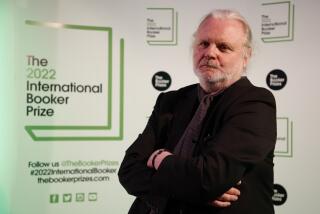Elias Canetti, 89; Reclusive Writer Won 1981 Nobel Prize
- Share via
ZURICH, Switzerland — Elias Canetti, the reclusive writer and fugitive from Nazism who won the 1981 Nobel Prize in literature, has died. He was 89.
Canetti, a Bulgarian-born British citizen who wrote in German, died Sunday, a relative said Thursday.
Canetti was buried Wednesday beside Irish author James Joyce. Zurich Mayor Josef Estermann said Canetti had expressed the wish to be buried in Zurich, a city he fell in love with during his childhood.
Canetti went into seclusion after being named winner of the Nobel Prize “for writings marked by a broad outlook, a wealth of ideas and artistic power.”
The Swedish Academy, which administers the prize, compared Canetti to Feodor Dostoevski and European writers of the early 20th Century whom he admired, including Franz Kafka.
Canetti began writing dramas and novels in the early 1930s, but developed a wide following among German readers only in 1960 with the publication of the first volume of his major work, “Masse und Macht” (Crowds and Power).
In a rare meeting with reporters in 1981, he noted that a theme common in his writings is “the importance of crowds in modern life, the terrifying importance of power which is in danger of destroying the whole earth.”
A nightmarish novel, “Die Blendung” (The Deception), which he wrote in the early 1930s, was not published in Vienna until 1963. But his drama, “Die Hochzeit” (The Wedding), was published in 1932 and two years later he completed his “Komodie der Eitelkeit” (Comedy of Vanity).
Canetti was also a distinguished essayist, dramatist and aphorist.
Canetti won the Nobel Prize at a time when the Swedish Academy was using the prize to draw attention to local masters who were unknown to a worldwide audience.
Admirers of Canetti’s elegant German prose believed that the award was overdue, but conceded that translators have had problems conveying his style into other languages.
Canetti was born July 25, 1905, in Rustchuk, Bulgaria.
In 1911, he moved with his parents to Manchester, England. On the death of his father two years later, he moved to Vienna, where he attended school before continuing his education in Zurich and Frankfurt, Germany. He returned to Vienna to earn a doctorate in chemistry.
Facing the Nazi takeover of Austria, Canetti, of Spanish-Jewish descent, left Austria in 1938 and went to Paris and then London, where he worked as a free-lance writer and was granted a British passport.
Later, he maintained homes in London and Zurich.
His first wife, Venetia Toubner-Calderon, died in 1963. His second wife, Hera Buschor, died in 1988. He had one daughter.
More to Read
Sign up for Essential California
The most important California stories and recommendations in your inbox every morning.
You may occasionally receive promotional content from the Los Angeles Times.












